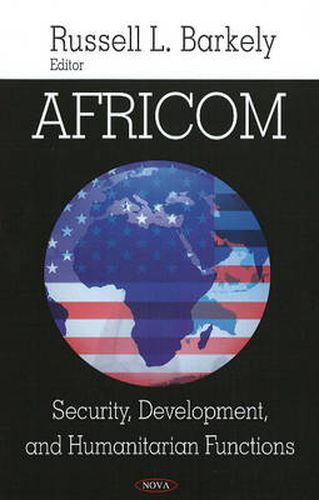Readings Newsletter
Become a Readings Member to make your shopping experience even easier.
Sign in or sign up for free!
You’re not far away from qualifying for FREE standard shipping within Australia
You’ve qualified for FREE standard shipping within Australia
The cart is loading…






The February 2007 decision to launch a new Department of Defense Unified Combatant Command for Africa (AFRICOM) has already been met with significant controversy both in the United States and abroad. AFRICOM’s proponents claim that the new command accurately reflects Africa’s growing strategic importance and an enlightened U.S. foreign policy focused on supporting African solutions to African problems. Its critics allege that the command demonstrates a self-serving American policy focused on fighting terrorism, securing the Africa’s burgeoning energy stocks, and countering Chinese influence. To overcome such misgivings, AFRICOM must demonstrate a commitment to programs mutually beneficial to both African and American national interests. Yet a shrewd strategic communication campaign will not be enough to convince a sceptical African public that AFRICOM’s priorities mirror their own. Indeed, much African distrust is justified. Since September 11, 2001 (9/11), the Department of Defense’s (DoD) most significant endeavours in Africa have been undertaken in pursuit of narrowly conceived goals related to the Global War on Terrorism (GWOT). Operations in North and East Africa, though couched in a larger framework of development, long-term counterinsurgency, and a campaign to win hearts and minds, have nonetheless relied on offensive military operations focused on short-term objectives.
$9.00 standard shipping within Australia
FREE standard shipping within Australia for orders over $100.00
Express & International shipping calculated at checkout
The February 2007 decision to launch a new Department of Defense Unified Combatant Command for Africa (AFRICOM) has already been met with significant controversy both in the United States and abroad. AFRICOM’s proponents claim that the new command accurately reflects Africa’s growing strategic importance and an enlightened U.S. foreign policy focused on supporting African solutions to African problems. Its critics allege that the command demonstrates a self-serving American policy focused on fighting terrorism, securing the Africa’s burgeoning energy stocks, and countering Chinese influence. To overcome such misgivings, AFRICOM must demonstrate a commitment to programs mutually beneficial to both African and American national interests. Yet a shrewd strategic communication campaign will not be enough to convince a sceptical African public that AFRICOM’s priorities mirror their own. Indeed, much African distrust is justified. Since September 11, 2001 (9/11), the Department of Defense’s (DoD) most significant endeavours in Africa have been undertaken in pursuit of narrowly conceived goals related to the Global War on Terrorism (GWOT). Operations in North and East Africa, though couched in a larger framework of development, long-term counterinsurgency, and a campaign to win hearts and minds, have nonetheless relied on offensive military operations focused on short-term objectives.